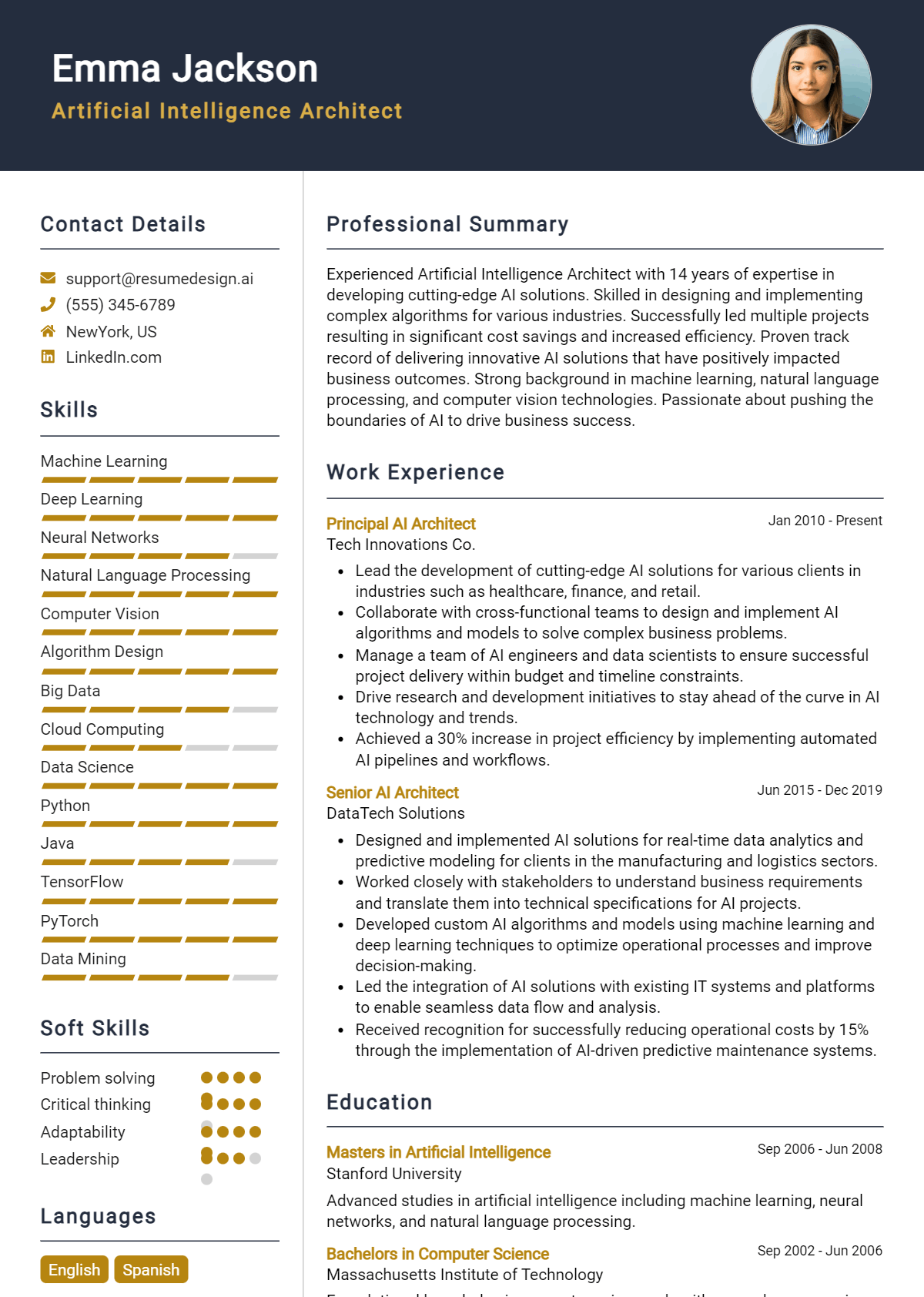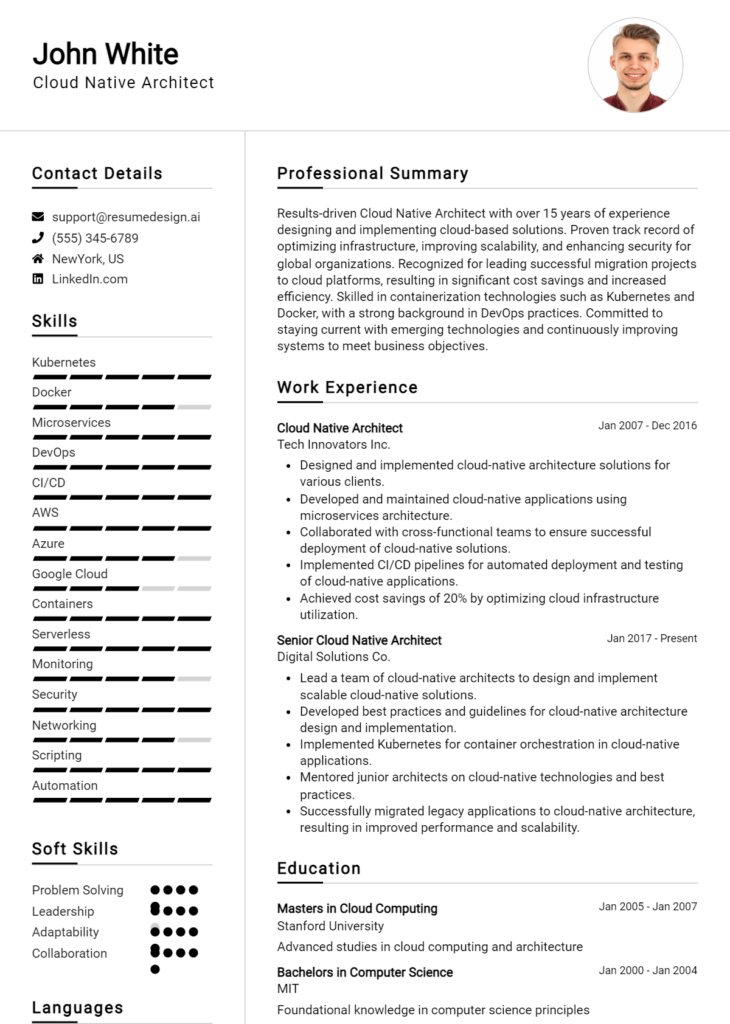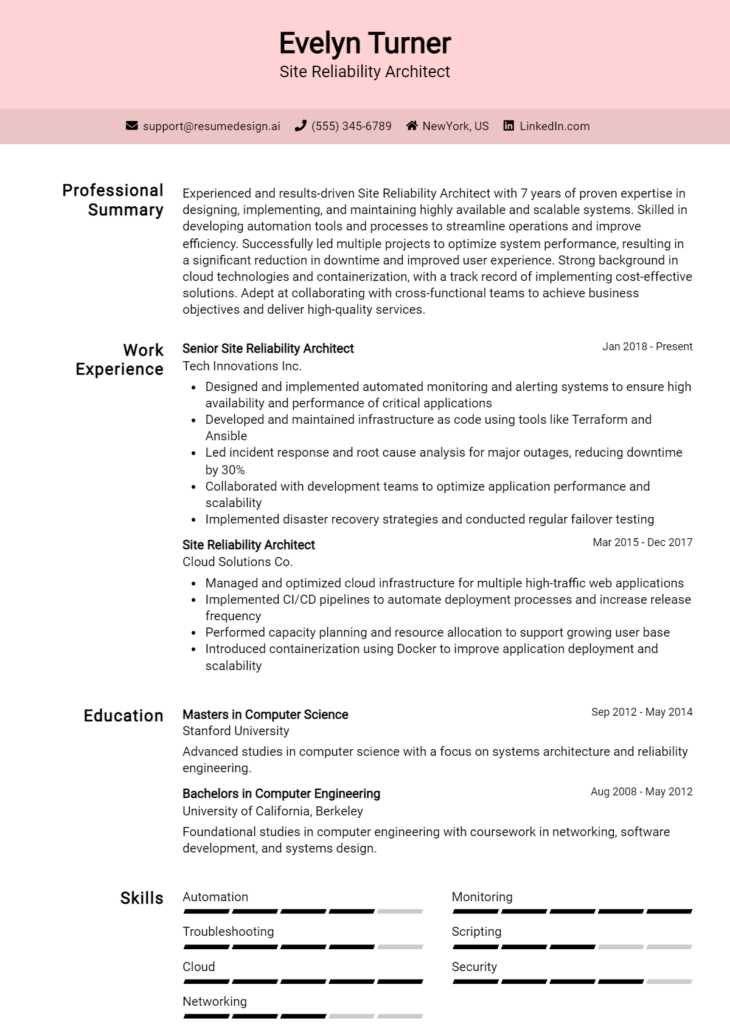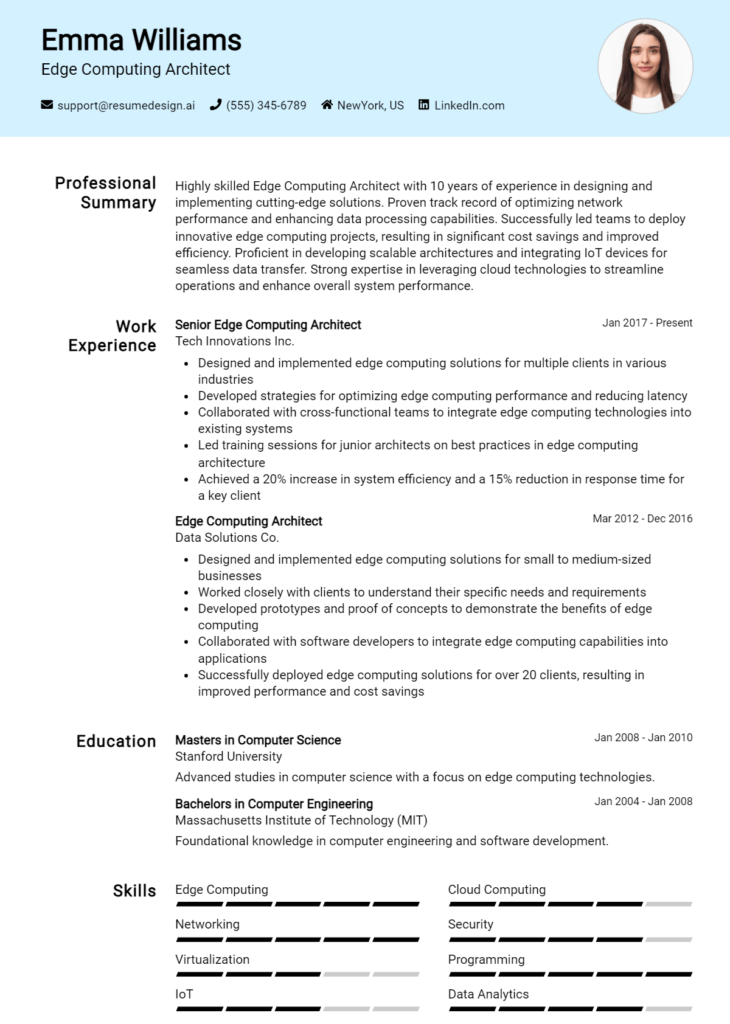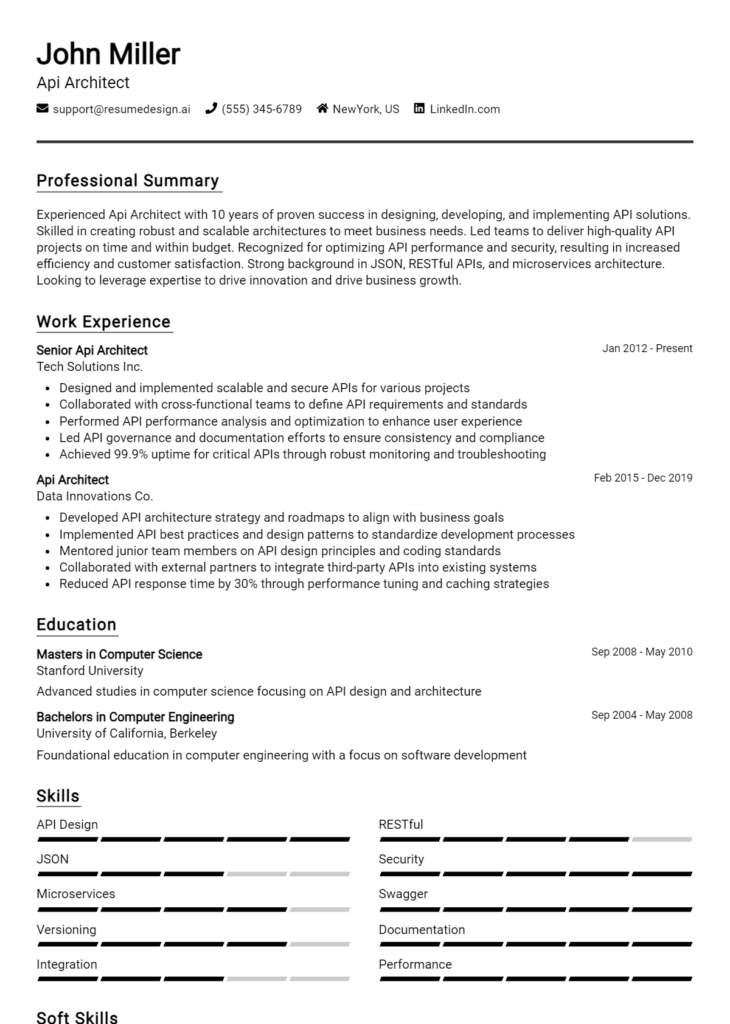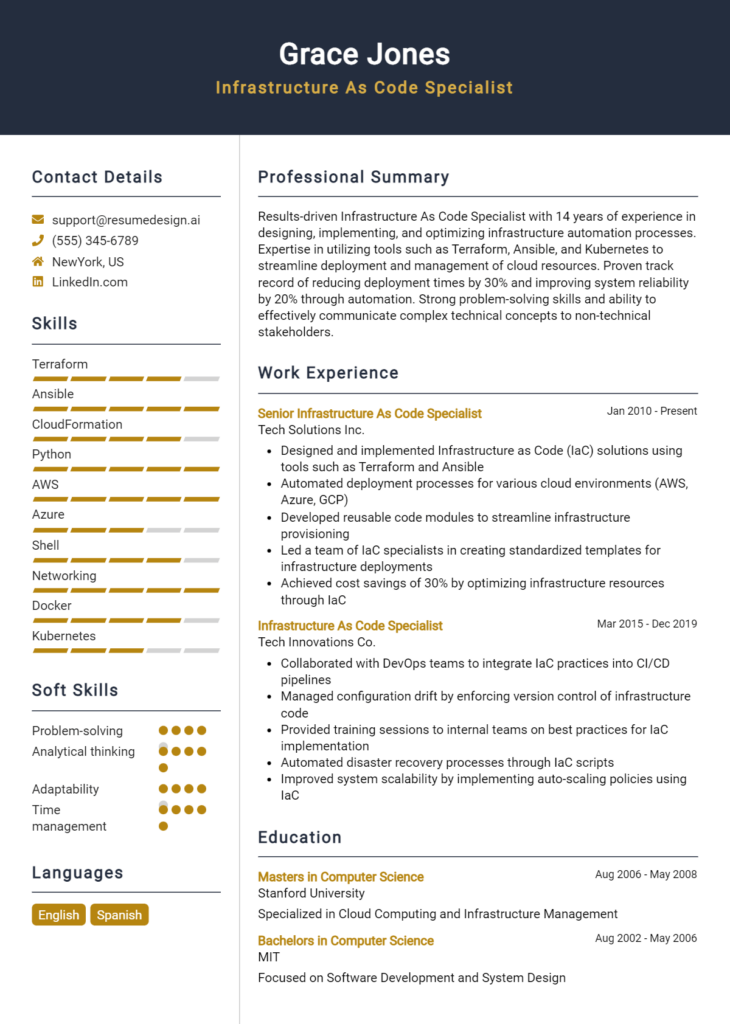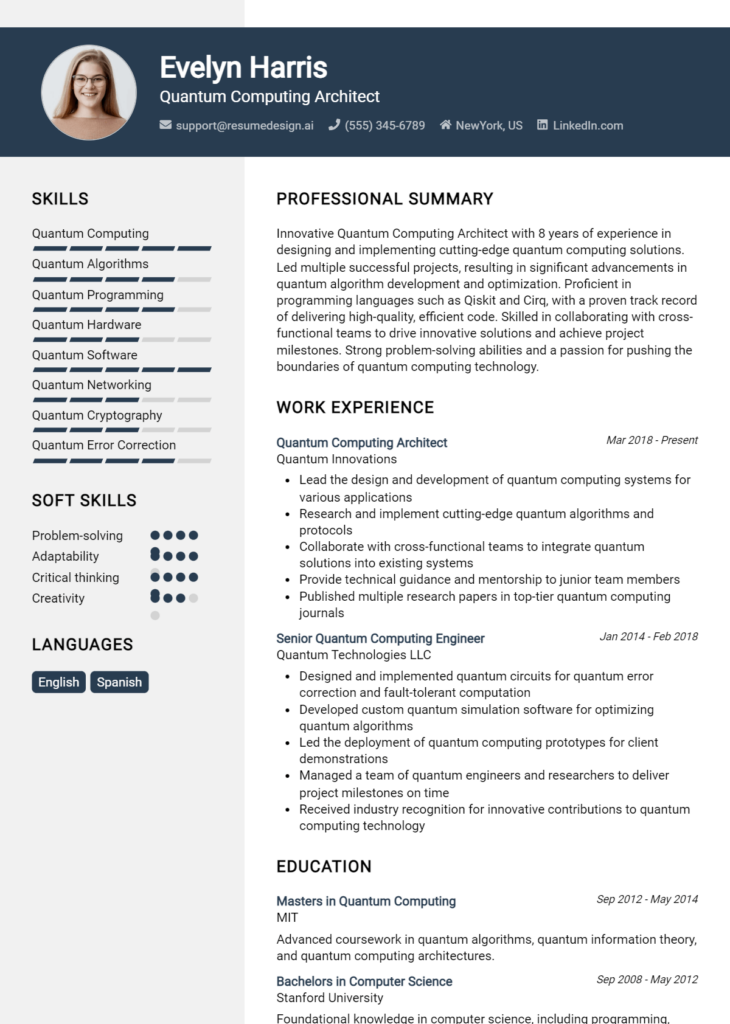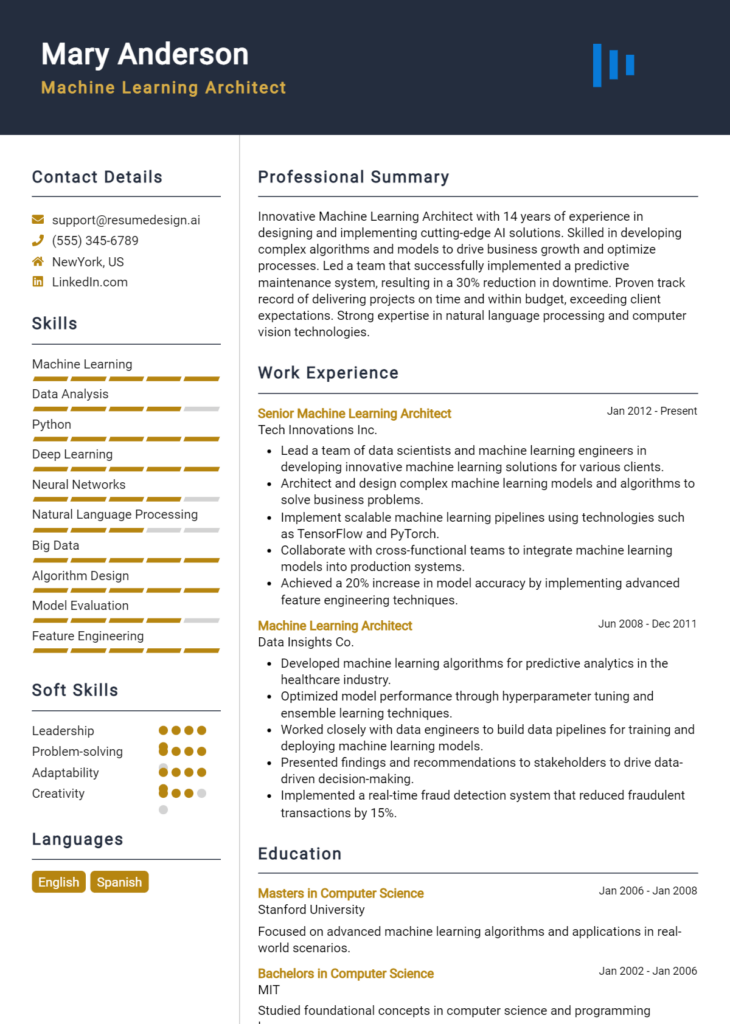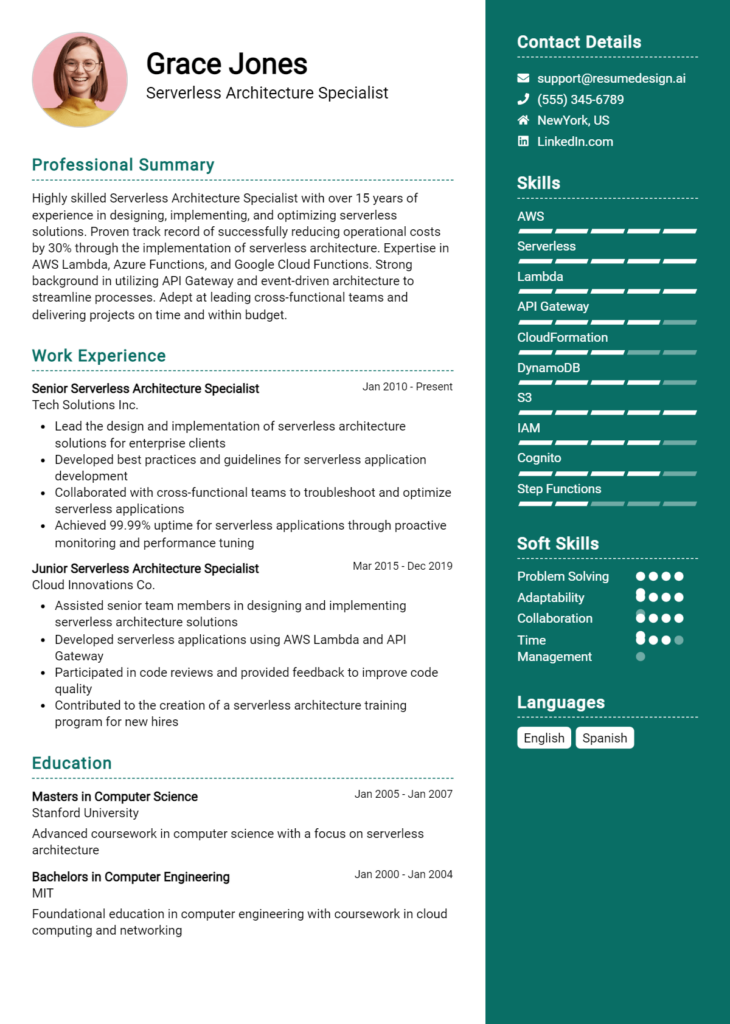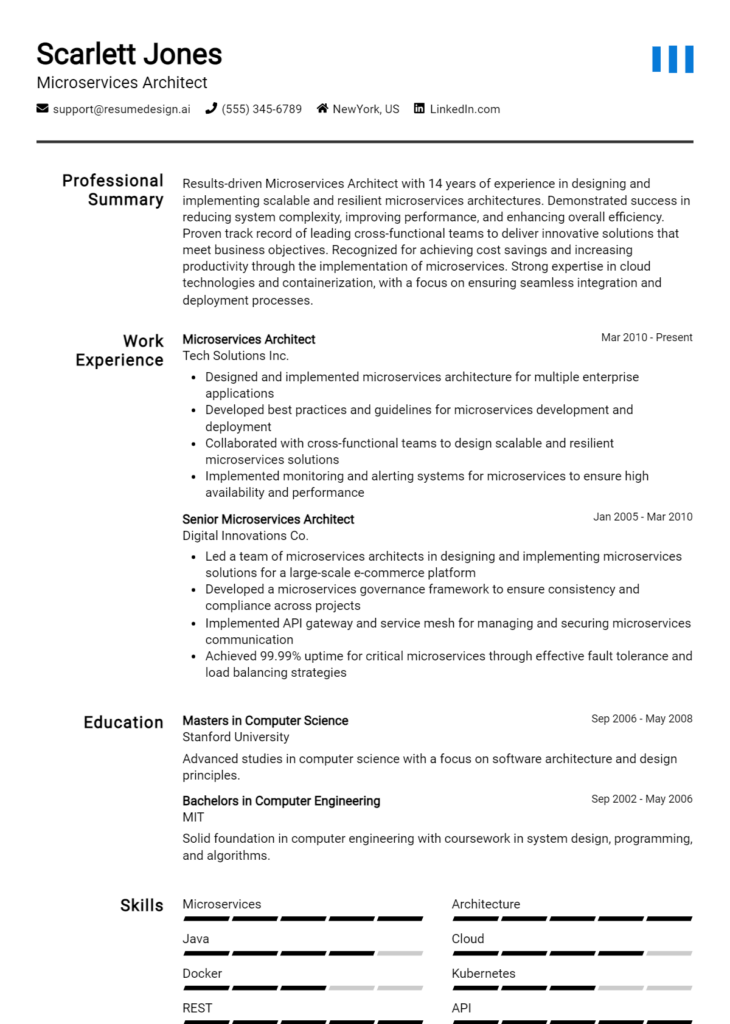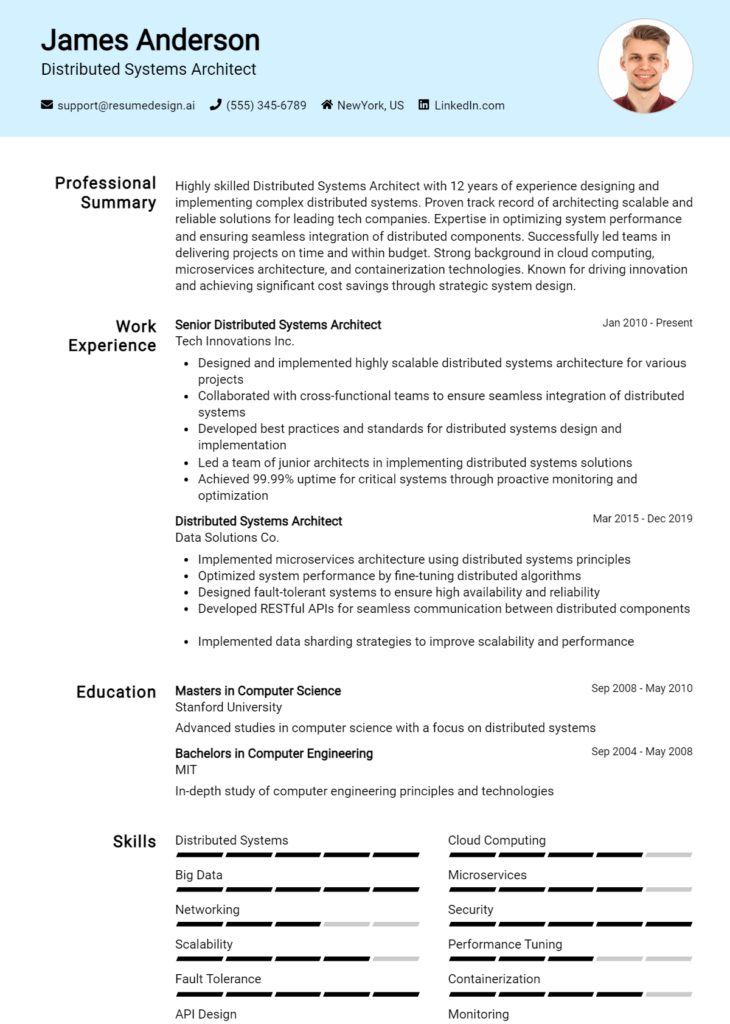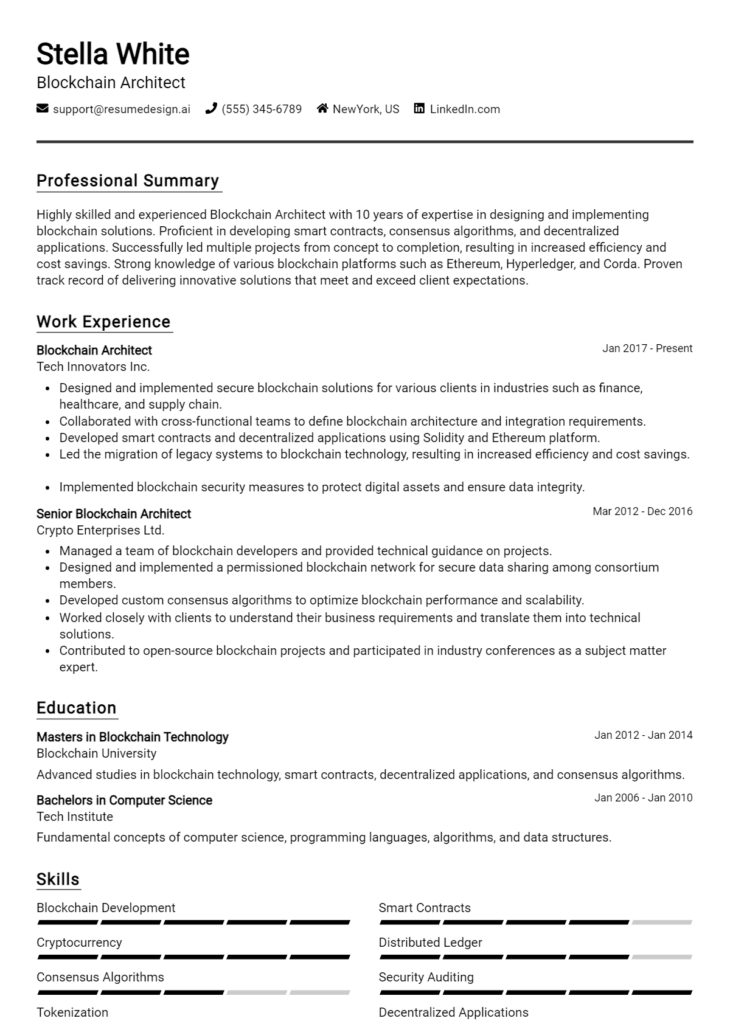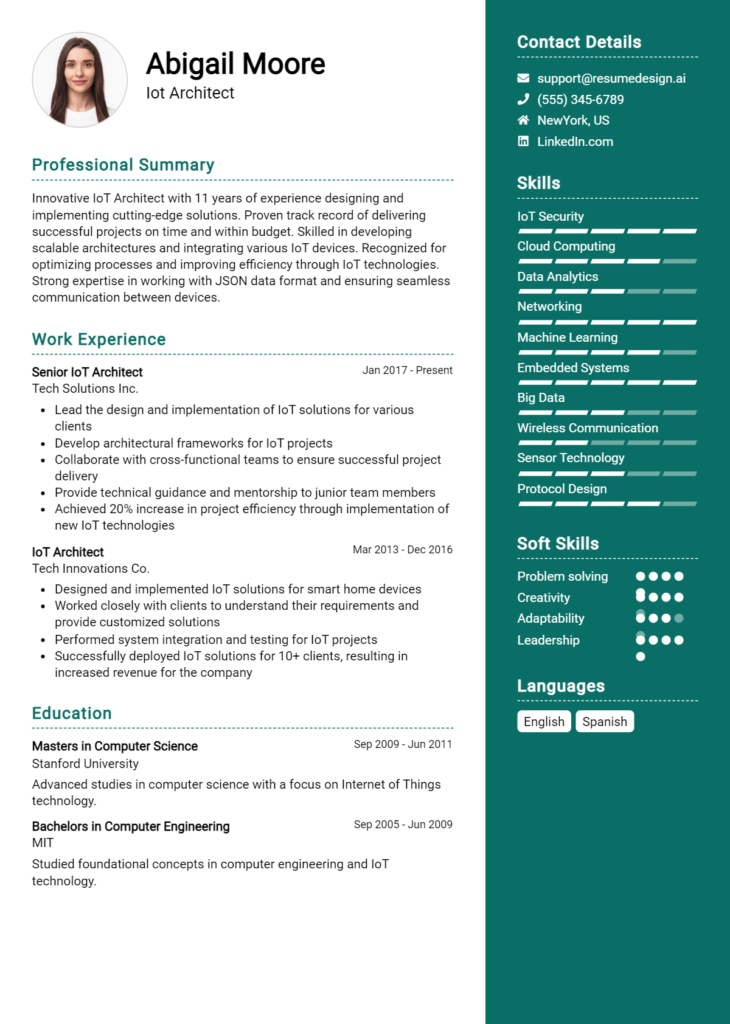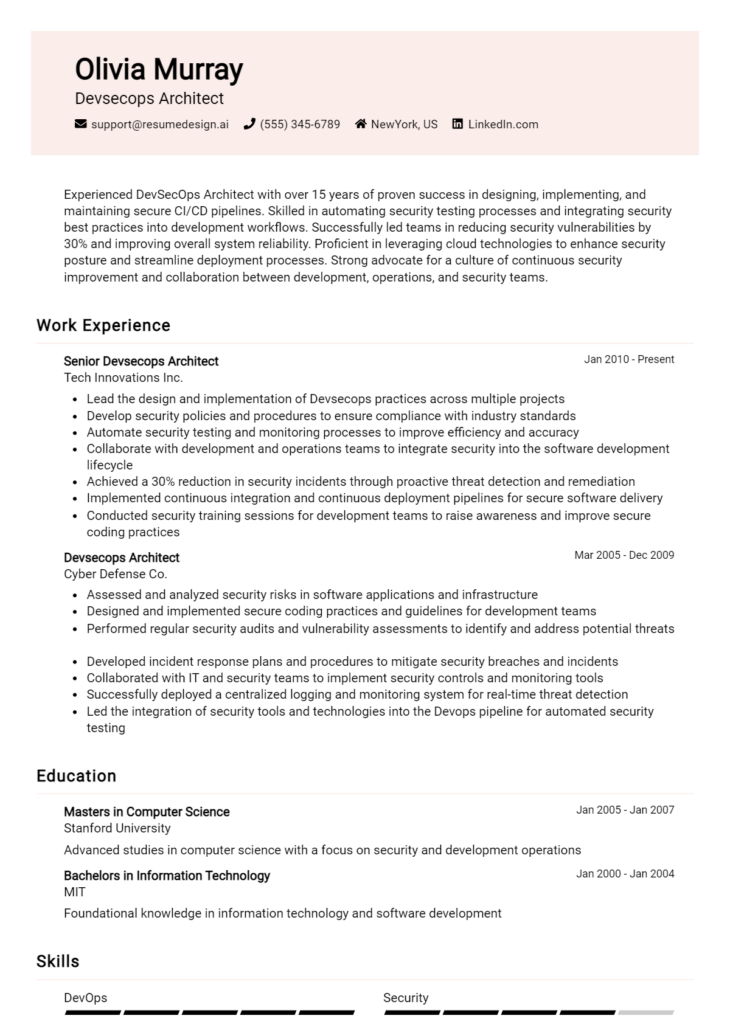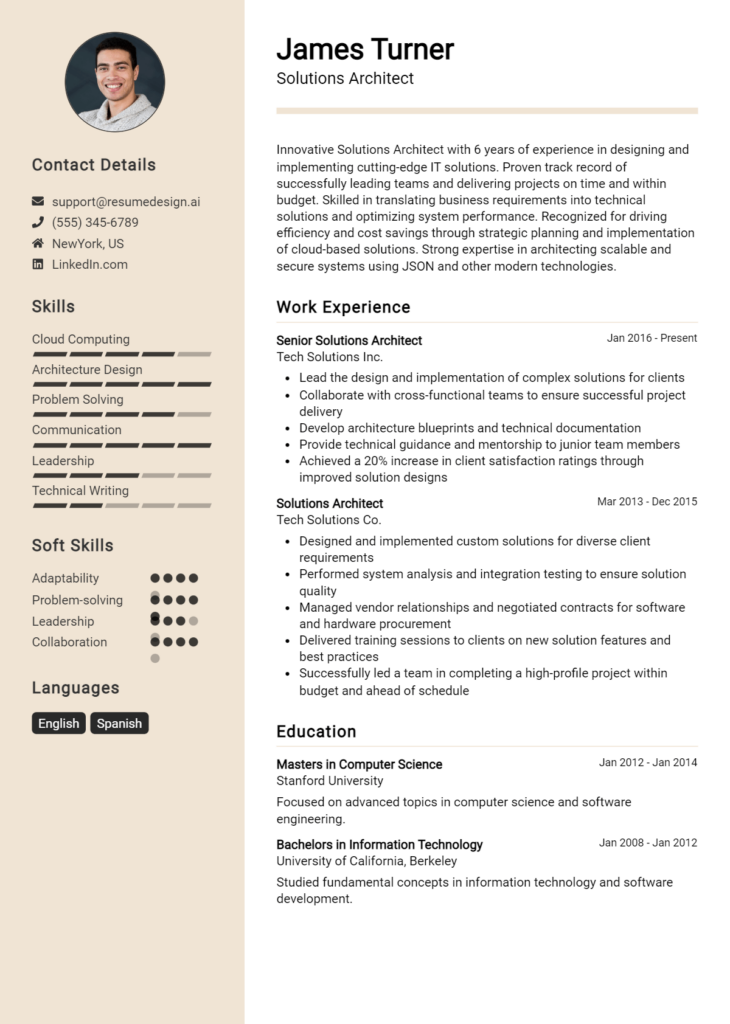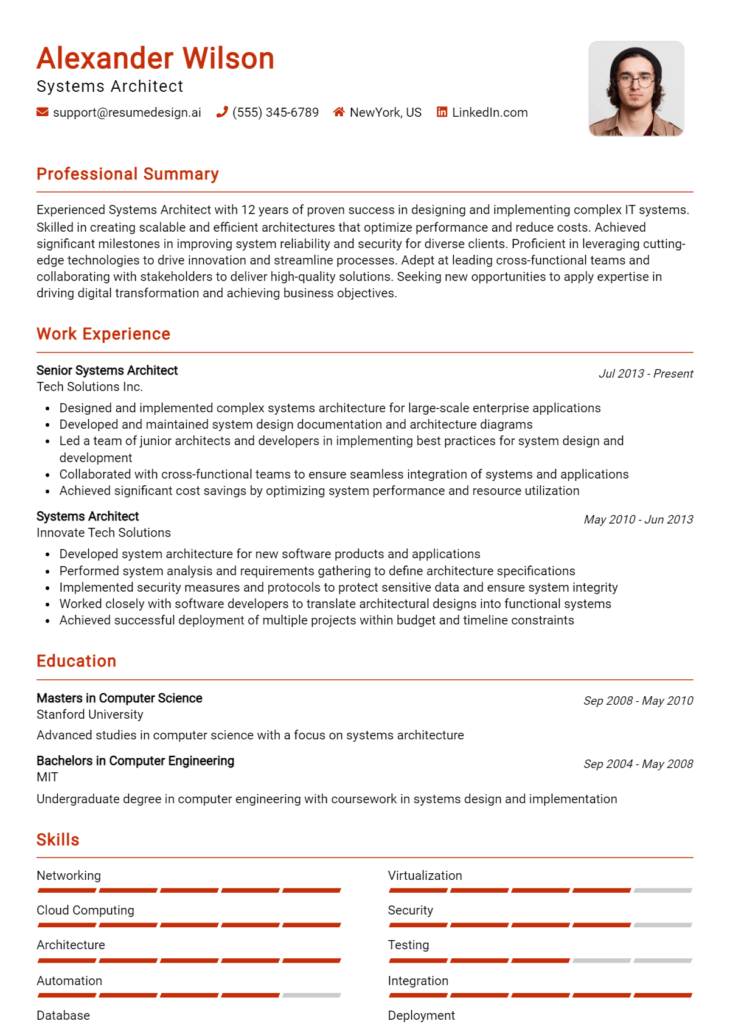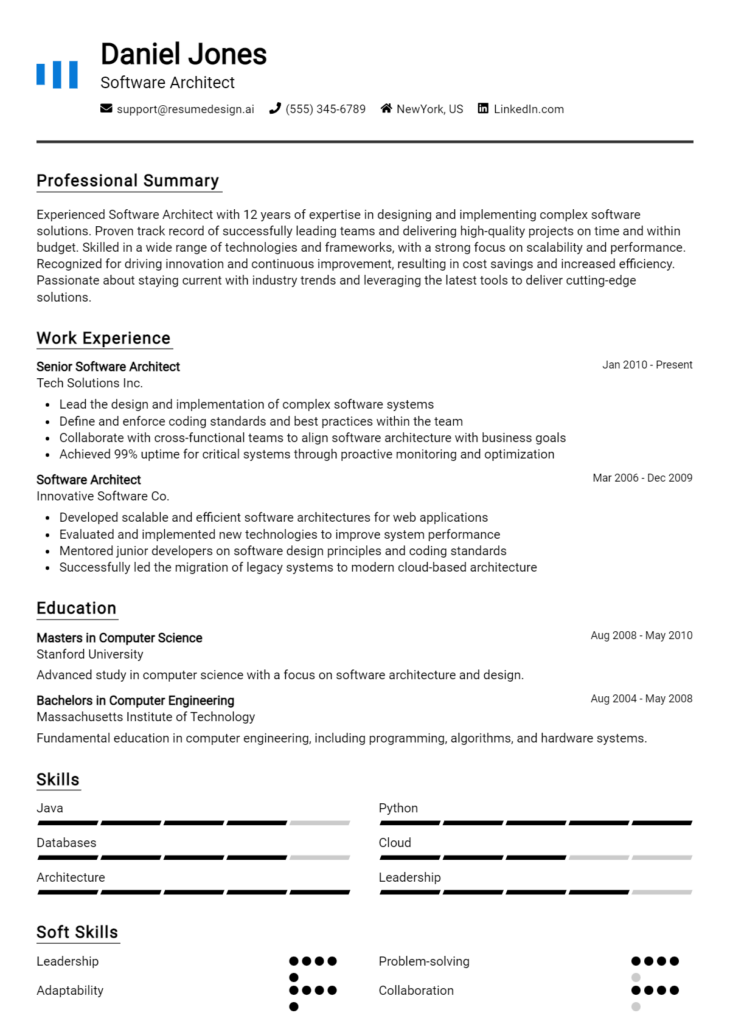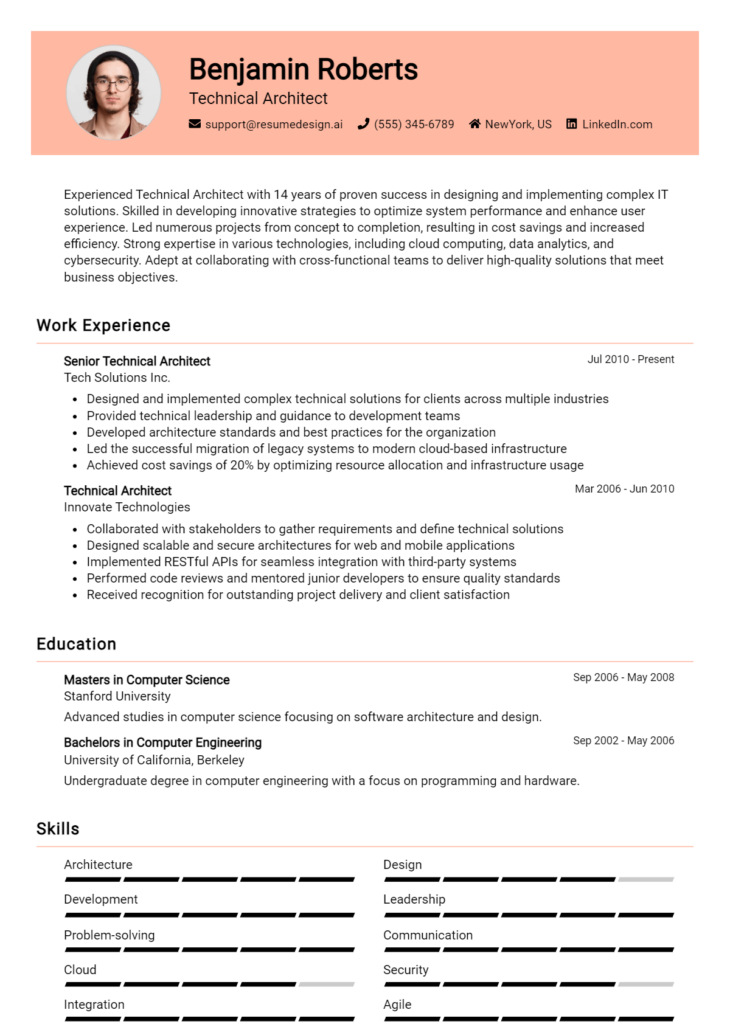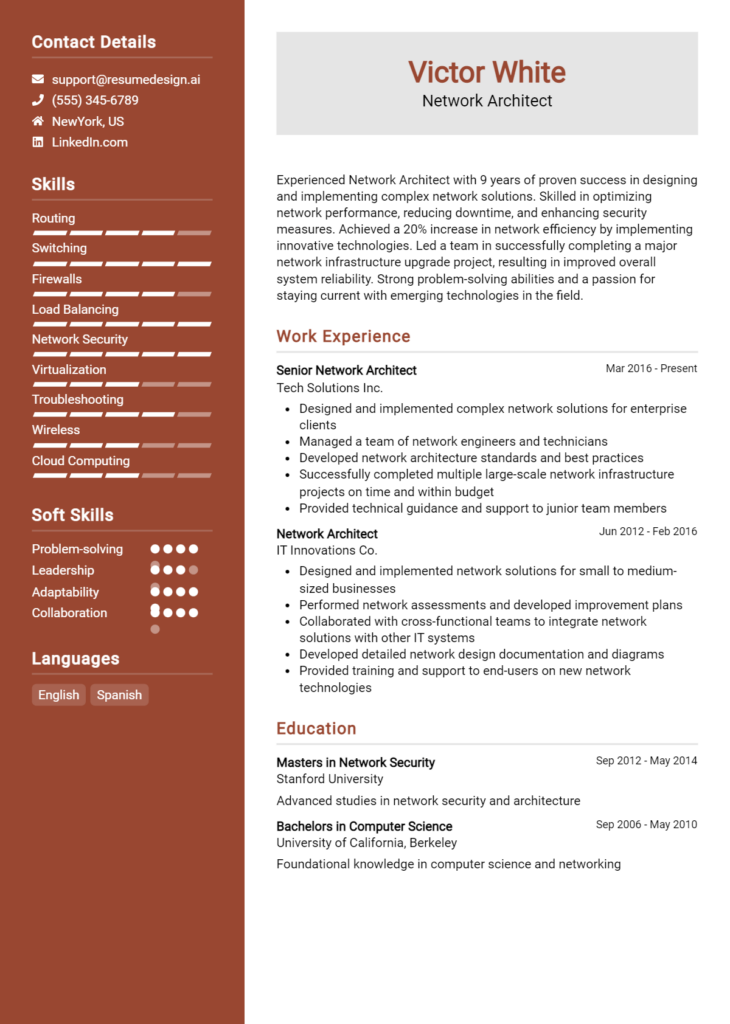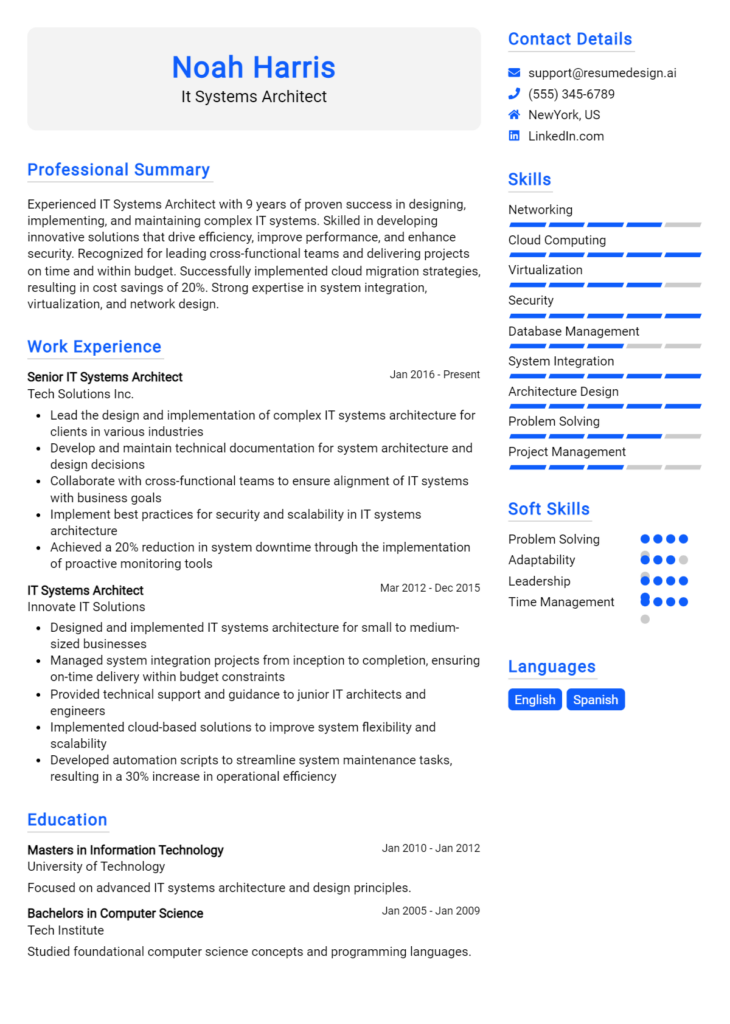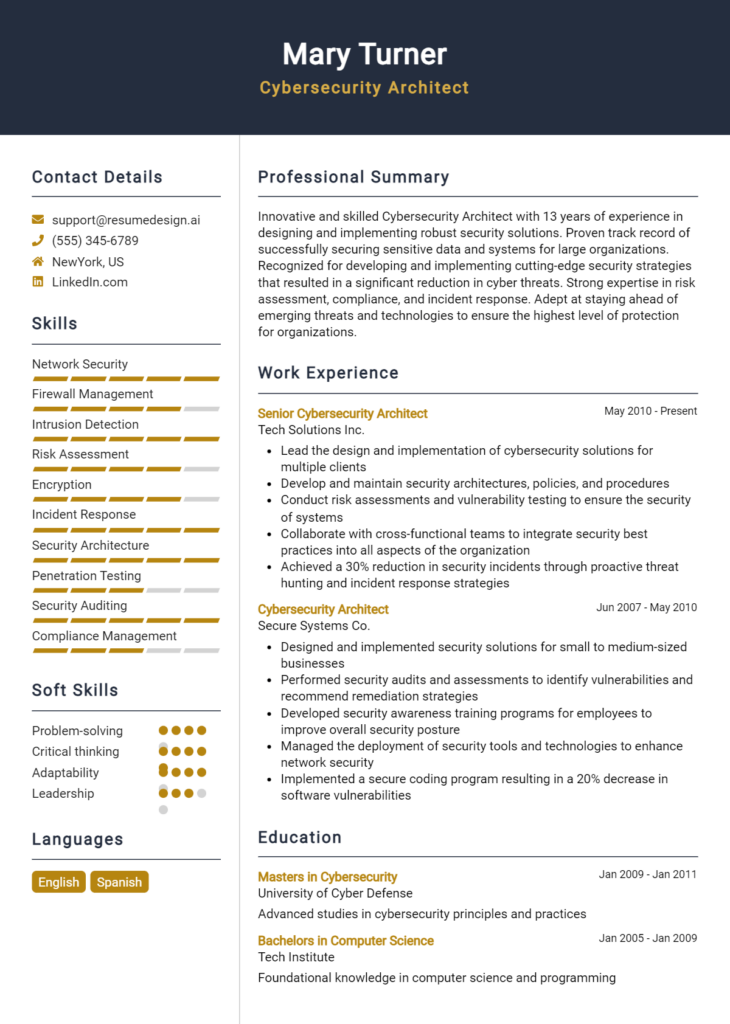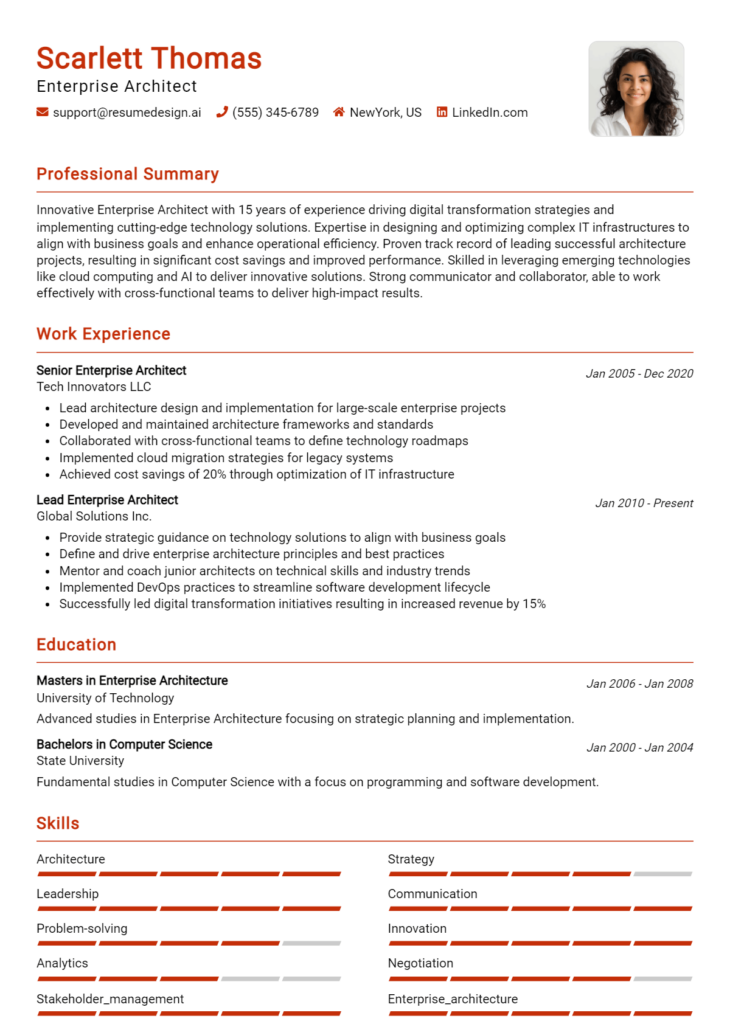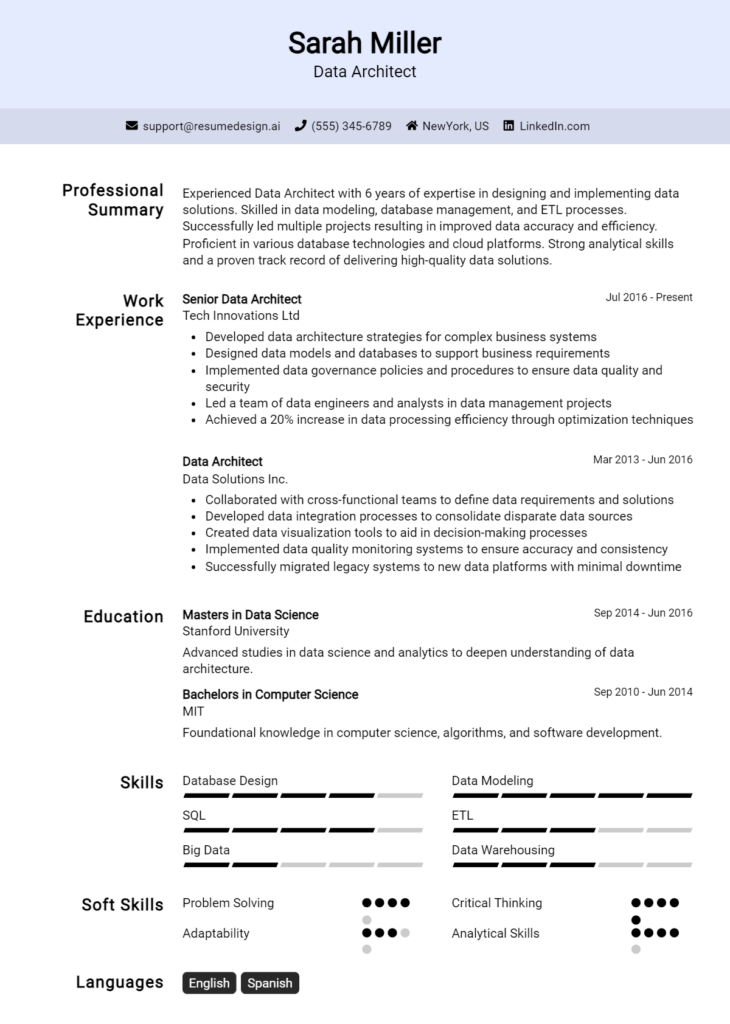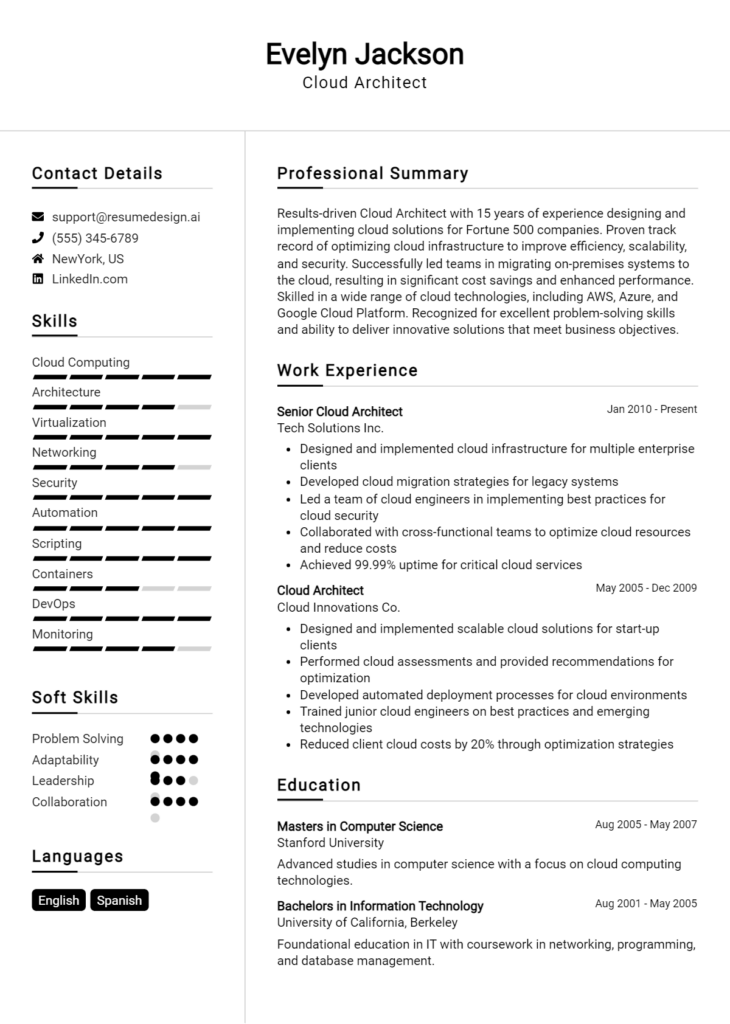Artificial Intelligence Architect Core Responsibilities
An Artificial Intelligence Architect plays a pivotal role in designing and implementing AI solutions that integrate seamlessly across various departments such as IT, operations, and business strategy. This professional must possess a robust set of technical skills, including machine learning algorithms and data analysis, alongside excellent operational and problem-solving abilities. These competencies are essential for aligning AI initiatives with organizational goals. A well-structured resume can effectively highlight these qualifications, demonstrating the architect's capability to drive innovation and efficiency within the company.
Common Responsibilities Listed on Artificial Intelligence Architect Resume
- Design and develop scalable AI models and algorithms.
- Collaborate with cross-functional teams to understand business needs.
- Evaluate and implement AI tools and frameworks.
- Analyze large datasets to extract actionable insights.
- Monitor and optimize AI systems for performance and accuracy.
- Provide technical guidance and mentoring to team members.
- Stay updated on emerging AI technologies and trends.
- Ensure compliance with data privacy regulations and ethical standards.
- Document architecture designs and technical specifications.
- Conduct feasibility studies and risk assessments for AI projects.
- Present findings and recommendations to stakeholders.
High-Level Resume Tips for Artificial Intelligence Architect Professionals
In today's competitive job market, a well-crafted resume is essential for Artificial Intelligence Architect professionals looking to make a lasting impression on potential employers. Your resume often serves as the first point of contact between you and your future employer, and it needs to effectively showcase your skills, achievements, and unique contributions to the field of artificial intelligence. A compelling resume not only highlights your technical expertise but also demonstrates how your experience aligns with the specific needs of the organization. This guide will provide practical and actionable resume tips specifically tailored for Artificial Intelligence Architect professionals, helping you stand out from the crowd.
Top Resume Tips for Artificial Intelligence Architect Professionals
- Tailor your resume to the job description by incorporating relevant keywords and phrases that match the specific requirements of the position.
- Showcase your relevant experience by detailing your past roles and responsibilities in AI projects, focusing on your contributions to architecture design and implementation.
- Quantify your achievements with specific metrics, such as improved model accuracy percentages, reduced processing times, or increased efficiency in AI workflows.
- Highlight industry-specific skills, including familiarity with machine learning frameworks (e.g., TensorFlow, PyTorch), cloud platforms (e.g., AWS, Azure), and data engineering tools.
- Use a clean and professional layout that enhances readability, ensuring that key information is easily accessible to hiring managers.
- Include relevant certifications and educational qualifications that reinforce your expertise in artificial intelligence and related technologies.
- Incorporate a summary statement that succinctly captures your core competencies and career objectives, making your value proposition clear from the outset.
- Utilize action verbs to describe your accomplishments, emphasizing your proactive approach in tackling challenges within AI projects.
- Consider adding a section for notable projects or publications that demonstrate your thought leadership and commitment to advancing the field of AI.
By implementing these tips, you can significantly enhance your resume and increase your chances of landing a job in the Artificial Intelligence Architect field. A strategically crafted resume that effectively communicates your skills and accomplishments will help you attract the attention of hiring managers and position you as a strong candidate in this rapidly evolving industry.
Why Resume Headlines & Titles are Important for Artificial Intelligence Architect
In the competitive field of artificial intelligence, having an impactful resume headline or title is crucial for an Artificial Intelligence Architect. A strong headline serves as a powerful first impression, capturing the attention of hiring managers and succinctly summarizing a candidate's key qualifications in just a few words. It should be concise, relevant, and directly related to the job being applied for, allowing candidates to stand out in a crowded job market. A well-crafted headline not only highlights the most pertinent skills and experiences but also sets the tone for the rest of the resume, making it an essential component of any successful application.
Best Practices for Crafting Resume Headlines for Artificial Intelligence Architect
- Keep it concise—limit to one or two lines.
- Use specific keywords related to the AI field and the job description.
- Highlight key skills or technologies relevant to the position.
- Incorporate measurable achievements where possible.
- Avoid generic phrases; tailor the headline to the specific role.
- Showcase your unique value proposition, such as years of experience or specialized knowledge.
- Utilize action-oriented language to convey confidence and capability.
- Consider the audience—what will resonate with hiring managers in AI?
Example Resume Headlines for Artificial Intelligence Architect
Strong Resume Headlines
"Innovative AI Architect with 10+ Years in Machine Learning and Neural Networks"
“Results-Driven AI Architect Specializing in Natural Language Processing and Big Data Solutions”
“Experienced AI Solutions Architect with Proven Track Record in Developing Scalable AI Systems”
Weak Resume Headlines
“AI Professional Seeking Opportunities”
“Engineer with Some Experience in AI”
The strong headlines are effective because they convey specific expertise and achievements, immediately aligning with what hiring managers are looking for in an Artificial Intelligence Architect. They are tailored to the role and highlight unique qualifications that suggest the candidate will add value to the organization. In contrast, the weak headlines lack specificity and do not demonstrate the candidate's qualifications or strengths, making it difficult for hiring managers to see how they fit the position or what unique contributions they might bring to the table.
Writing an Exceptional Artificial Intelligence Architect Resume Summary
In the competitive landscape of artificial intelligence, a well-crafted resume summary serves as a critical first impression for an Artificial Intelligence Architect. This brief section of the resume quickly captures the attention of hiring managers by effectively showcasing key skills, relevant experience, and noteworthy accomplishments that align with the job role. A strong summary is concise, impactful, and tailored to the specific position, allowing candidates to stand out in a crowded field and demonstrate their potential contribution to the organization right from the start.
Best Practices for Writing a Artificial Intelligence Architect Resume Summary
- Quantify Achievements: Use numbers to illustrate your successes and impact in previous roles.
- Focus on Key Skills: Highlight technical proficiencies and soft skills that are directly relevant to the job description.
- Tailor for the Job: Customize the summary for each application to reflect the specific requirements and priorities of the employer.
- Keep it Concise: Aim for 2-4 sentences that effectively convey your qualifications without overwhelming the reader.
- Use Action Verbs: Start sentences with strong action verbs to convey energy and initiative.
- Showcase Relevant Experience: Highlight specific experiences that demonstrate your ability to succeed in the role.
- Include Industry Keywords: Incorporate terminology and keywords from the job listing to pass through Applicant Tracking Systems (ATS).
- Demonstrate Passion: Convey your enthusiasm for artificial intelligence and technology to connect with potential employers.
Example Artificial Intelligence Architect Resume Summaries
Strong Resume Summaries
Dynamic Artificial Intelligence Architect with over 8 years of experience in designing scalable AI systems, achieving a 30% reduction in processing time for large datasets. Proficient in machine learning algorithms, deep learning frameworks, and data engineering.
Results-driven AI Architect specializing in natural language processing and computer vision, successfully leading a team that delivered a predictive analytics tool that increased client retention by 40%. Skilled in TensorFlow, Python, and cloud technologies.
Innovative AI Architect with a proven track record of implementing AI solutions that boost operational efficiency by 25%. Expertise in deploying neural networks and collaborating with cross-functional teams to align AI strategies with business goals.
Weak Resume Summaries
Experienced professional looking for an AI Architect position. Familiar with machine learning and AI technologies.
AI Architect with some experience in the field and knowledge of various technologies. Seeking opportunities to grow in a challenging environment.
The examples above illustrate the stark contrast between strong and weak resume summaries. Strong summaries are characterized by quantifiable achievements, specific technical skills, and clear relevance to the job role, effectively demonstrating the candidate's value. In contrast, weak summaries lack detail and specificity, making it difficult for hiring managers to assess the candidate's qualifications or contributions, ultimately diminishing their chances of standing out in the application process.
Work Experience Section for Artificial Intelligence Architect Resume
The work experience section of an Artificial Intelligence Architect resume is crucial in demonstrating the candidate's technical skills and leadership capabilities. This section not only highlights the applicant's ability to design and implement innovative AI solutions but also showcases their proficiency in managing teams and delivering high-quality products that align with business objectives. By quantifying achievements and ensuring that the experience aligns with industry standards, candidates can effectively illustrate their impact in previous roles, making a compelling case for their suitability for the position.
Best Practices for Artificial Intelligence Architect Work Experience
- Emphasize relevant technical skills such as machine learning, data analysis, and programming languages.
- Quantify achievements with metrics, such as percentage improvements in efficiency or cost savings.
- Highlight leadership experience, including managing teams and guiding projects from inception to completion.
- Showcase collaboration with cross-functional teams to emphasize teamwork and communication skills.
- Align experiences with industry standards and best practices to demonstrate knowledge of current trends.
- Use action verbs to convey a sense of initiative and impact in previous roles.
- Include relevant certifications or training to bolster credibility and expertise.
- Tailor the work experience section to the specific job description to make it more relevant to potential employers.
Example Work Experiences for Artificial Intelligence Architect
Strong Experiences
- Led a team of 10 data scientists to develop a machine learning model that increased predictive accuracy by 35%, resulting in a $500,000 annual revenue boost.
- Architected a scalable AI-driven recommendation system which improved customer engagement metrics by 50% over six months.
- Collaborated with cross-functional teams to deliver 5 AI solutions within budget and ahead of schedule, enhancing operational efficiency by 30%.
- Implemented a data governance framework that reduced data processing time by 40%, streamlining project workflows.
Weak Experiences
- Worked on various AI projects in a team setting.
- Involved in developing software solutions.
- Participated in meetings to discuss project planning.
- Assisted with some data analysis tasks.
The examples of strong experiences are considered effective because they provide clear, quantifiable outcomes that demonstrate the candidate's impact on the organization. They also illustrate leadership and collaboration skills in a substantive way. In contrast, the weak experiences lack specificity and measurable results, making them less compelling to potential employers. By focusing on concrete achievements and responsibilities, candidates can significantly enhance their appeal in the competitive field of AI architecture.
Education and Certifications Section for Artificial Intelligence Architect Resume
The education and certifications section of an Artificial Intelligence Architect resume is crucial as it serves to showcase the candidate's academic background and their commitment to continuous learning in a rapidly evolving field. This section not only highlights relevant degrees and specialized training but also emphasizes industry-recognized certifications that validate the candidate's expertise. By providing details about relevant coursework and certifications, candidates can significantly enhance their credibility and demonstrate their alignment with the specific requirements of the job role, making a strong case for their suitability in the competitive landscape of artificial intelligence.
Best Practices for Artificial Intelligence Architect Education and Certifications
- Include degrees in relevant fields such as Computer Science, Data Science, or Machine Learning.
- List industry-recognized certifications such as AWS Certified Machine Learning, Microsoft Certified: Azure AI Engineer Associate, or Google Cloud Professional Machine Learning Engineer.
- Highlight relevant coursework that pertains to AI, machine learning algorithms, data analytics, and neural networks.
- Emphasize any specialized training in tools and technologies commonly used in AI architecture, such as TensorFlow, PyTorch, or Apache Spark.
- Provide the dates of completion for degrees and certifications to show your most recent qualifications.
- Maintain a clear and organized format to make it easy for recruiters to scan and identify key qualifications.
- Tailor the education and certifications section to align with the specific job description of the AI Architect role.
- Incorporate any ongoing education or professional development courses to indicate a commitment to staying current in the field.
Example Education and Certifications for Artificial Intelligence Architect
Strong Examples
- M.S. in Computer Science with a focus on Artificial Intelligence, Stanford University, 2022
- AWS Certified Machine Learning - Specialty, 2023
- Certification in Data Science and Machine Learning, Coursera, 2021
- Relevant coursework: Deep Learning, Natural Language Processing, and Computer Vision.
Weak Examples
- B.A. in Philosophy, University of XYZ, 2010
- Certification in Basic Computer Skills, 2015
- Outdated course on General Programming, 2010
- High School Diploma, 2008
The examples provided illustrate the distinction between strong and weak qualifications for an Artificial Intelligence Architect. Strong examples are directly relevant to the field of artificial intelligence and demonstrate a robust understanding of advanced concepts, as well as up-to-date credentials. In contrast, weak examples lack relevance to the job role, showcase outdated qualifications, or highlight degrees and certifications that do not contribute to the candidate’s suitability for an AI-focused position, ultimately diminishing their competitiveness in the job market.
Top Skills & Keywords for Artificial Intelligence Architect Resume
As an Artificial Intelligence Architect, showcasing a well-rounded set of skills on your resume is crucial for standing out in a competitive job market. The right blend of hard and soft skills not only demonstrates your technical proficiency but also highlights your ability to collaborate, communicate, and lead within diverse teams. Employers are increasingly looking for candidates who can bridge the gap between complex AI technologies and practical applications, making it essential to emphasize both your technical expertise and interpersonal qualities. By aligning your skills with the job requirements, you can create a compelling resume that effectively communicates your value to potential employers. For additional insights on how to present your skills effectively, visit our skills page and explore the importance of showcasing relevant work experience.
Top Hard & Soft Skills for Artificial Intelligence Architect
Soft Skills
- Strong Communication Skills
- Team Collaboration
- Problem-Solving Ability
- Critical Thinking
- Adaptability
- Creativity
- Leadership Skills
- Attention to Detail
- Time Management
- Project Management
Hard Skills
- Machine Learning Algorithms
- Deep Learning Frameworks (e.g., TensorFlow, PyTorch)
- Data Analysis and Visualization
- Natural Language Processing (NLP)
- Cloud Computing Platforms (e.g., AWS, Azure)
- Programming Languages (e.g., Python, R, Java)
- Model Deployment and Optimization
- Data Engineering
- AI Ethics and Governance
- Software Development Lifecycle (SDLC)
Stand Out with a Winning Artificial Intelligence Architect Cover Letter
Dear Hiring Manager,
I am writing to express my enthusiasm for the Artificial Intelligence Architect position at [Company Name], as advertised on [Job Board/Company Website]. With a robust background in machine learning, data analytics, and software architecture, I am excited about the opportunity to contribute to your team by designing innovative AI solutions that drive business success. My experience in developing scalable AI models and my passion for leveraging technology to solve complex problems make me a strong candidate for this role.
In my previous position at [Previous Company], I led a team of data scientists and engineers in the development of an AI-driven recommendation system that enhanced user engagement by 30%. I was responsible for the end-to-end architecture of the solution, from data ingestion and preprocessing to model selection and deployment. My deep understanding of various machine learning frameworks, coupled with my ability to communicate complex technical concepts to stakeholders, allowed us to deliver a product that not only met but exceeded client expectations. I am particularly drawn to [Company Name] because of its commitment to innovation and its focus on using AI to create meaningful impact in [specific industry or area].
I am also well-versed in the ethical considerations surrounding AI technologies, and I believe that responsible AI practices are crucial for sustainable development. I have actively participated in initiatives that promote transparency and fairness in AI systems, ensuring that the solutions we build are not only effective but also equitable. I am excited about the prospect of bringing this perspective to [Company Name] and collaborating with a team that values integrity in technology.
I look forward to the opportunity to discuss how my skills and experiences align with the goals of your organization. Thank you for considering my application. I am eager to contribute to [Company Name]’s vision of harnessing AI to drive transformative change and innovation.
Sincerely,
[Your Name]
[Your Contact Information]
[LinkedIn Profile or Portfolio Link]
Common Mistakes to Avoid in a Artificial Intelligence Architect Resume
When crafting a resume for the role of an Artificial Intelligence Architect, it's crucial to present a clear and compelling narrative of your skills, experience, and accomplishments. However, there are several common pitfalls that candidates might encounter, which can detract from the overall impact of their resume. Avoiding these mistakes can significantly enhance your chances of standing out in a competitive field. Here are some key mistakes to watch out for:
Overloading with Technical Jargon: While it's important to demonstrate your technical knowledge, using excessive jargon can alienate recruiters who may not be familiar with all the terms. Strive for clarity and balance.
Lack of Quantifiable Achievements: Failing to include specific metrics or outcomes can make your contributions seem vague. Highlight achievements with measurable results, such as increased efficiency or revenue growth.
Ignoring Soft Skills: Focusing solely on technical skills can lead to a one-dimensional resume. Artificial Intelligence Architects must also possess leadership, communication, and collaboration skills. Include examples that showcase these abilities.
Generic Objective Statements: A generic objective statement can make your resume blend in with others. Tailor your objective to reflect your aspirations and how they align with the organization’s goals.
Neglecting Continuous Learning: The field of AI is rapidly evolving. Not mentioning ongoing education or certifications can give the impression that you are not keeping up with industry trends. Include relevant courses or certifications to demonstrate your commitment to growth.
Poor Formatting and Structure: A cluttered or confusing layout can detract from your content. Use clear headings, bullet points, and consistent formatting to enhance readability and ensure your key points stand out.
Not Tailoring for Each Application: Sending out a generic resume without customizing it for each job application can be detrimental. Tailor your resume to highlight skills and experiences that are most relevant to the specific position you’re applying for.
Omitting Relevant Projects: Failing to include key projects that demonstrate your expertise in AI can weaken your resume. Highlight significant projects where you applied your skills, detailing your role and the impact of the project.
Conclusion
As we explored the critical role of an Artificial Intelligence Architect, it’s clear that this position requires a unique blend of technical expertise, strategic thinking, and innovative problem-solving. Key responsibilities include designing AI systems, working with machine learning frameworks, and ensuring that AI solutions align with business goals. Furthermore, proficiency in programming languages, data analysis, and cloud computing is essential for success in this role.
Given the competitive nature of the field, having a standout resume is vital. Make sure your resume highlights your relevant experiences, skills, and accomplishments that reflect your capabilities as an AI Architect.
Now is the perfect time to review your resume and ensure it accurately represents your qualifications. To assist you in this process, consider utilizing tools like resume templates, resume builder, resume examples, and cover letter templates. These resources can help you create a polished and professional resume that showcases your expertise and makes a strong impression on potential employers. Take action today and elevate your career prospects!

